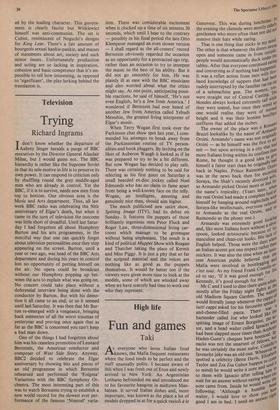Television
Trying
Richard Ingrams
T don't know whether the departure of 'Aubrey Singer heralds a purge of BBC executives by the Director General Alasdair Milne, but I would guess not. The BBC hierarchy is rather like the Supreme Soviet in that its sole motive in life is to preserve its own power. It can respond to criticism only by shuffling round the grey middle-aged men who are already in control. Yet the BBC, if it is to survive, needs new men from top to bottom. One obvious area is the Music and Arts department. Thus, all last week BBC radio was celebrating the 50th anniversary of Elgar's death, but when it came to the turn of television the outcome was little short of dreadful. Until last Satur- day I had forgotten all about Humphrey Burton and his arts programmes, in the merciful way that one can quickly forget about television personalities once they stop appearing on the screen. Burton, until a year or two ago, was head of the BBC Arts department and during his years in control lost no opportunity of putting himself on the air. No opera could be broadcast without our Humphrey popping up bet- ween the acts to explain what was going on. No concert could take place without a deferential interview being done with the conductor by Burton. But with his demo- tion it all came to an end, or so it seemed until last Saturday. It was then that Mr Bur- ton re-emerged with a vengeance, bringing back memories of all the worst traumas of yesteryear and proving once again that as far as the BBC is concerned you can't keep a bad man down.
One of the things I had forgotten about him was his ceaseless promotion of Leonard Bernstein, the American conductor and composer of West Side Story. Anyway, BBC2 decided to celebrate the Elgar anniversary by showing bits and pieces of an old programme in which Bernstein rehearsed and performed the 'Enigma' Variations with the BBC Symphony Or- chestra. The most interesting part of this was to watch Bernstein trying to establish a new world record for the slowest ever per- formance of the famous 'Nimrod' varia-
tion. There was considerable excitement when it clocked up a time of six minutes 30 seconds, which until I hear to the contrary — possibly in his final period the late Otto Klemperer managed an even slower version — I shall regard as the all-comers' record Bernstein obviously regarded the occasion as an opportunity for a protracted ego trip, rather than an occasion to try to interpret the music to the best of his ability. But it did not go smoothly for him. He was plainly ill at ease with the BBC musicians and also worried about what the critics might say. At one point, anticipating possi- ble reactions, he said of himself, 'He's not even English, he's a Jew from America.' I wondered if Bernstein had ever heard of another Jew from America called Yehudi Menuhin, the greatest living interpreter of Elgar's music.
When Terry Wogan first took over the Parkinson chat show spot last year, I com- mended his attempts to break away from the Parkinsonian routine of TV person- alities and book pluggers. By inviting on the likes of Auberon Waugh it looked as if he was prepared to try to be a bit different. But now Wogan has decided to play safe. There was certainly nothing to be said for selecting as his first guest on Saturday a small bearded ex-disc jockey called Noel Edmonds who has no claim to fame apart from being a well-known face on the telly. Wogan, an intelligent, amusing and genuinely nice man, should aim higher.
The much publicised new satire show, Spitting Image (ITV), had its debut on Sunday. It features the puppets of those brilliantly ingenious men Peter Fluck and Roger Law, three-dimensional living car- toons which manage to be grotesque without being unpleasant. The result is a kind of political Muppet Show with Reagan and Thatcher taking the place of Kermit and Miss Piggy. It is just a pity that so far the scripted material and the voices are nothing like as good as the puppets themselves. It would be better too if the viewers were given more time to look at the models, some of which are whisked away when we have scarcely had time to work out who they represent.










































 Previous page
Previous page